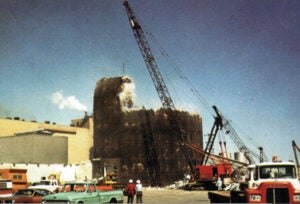The $6.8 billion Exelon acquisition of Washington, D.C.–based Pepco Holdings jumped its final hurdle Wednesday (March 23), as the District of Columbia Public Service Commission approved the deal by a 2-1 vote.
The Washington Post described the action by the local regulators as “a surprise move.”
The approval, following earlier thumbs-ups from the Federal Energy Regulatory Commission, the Justice Department, and the states of Maryland, Delaware, and New Jersey, would create the nation’s largest publicly held utility in terms of number of customers. The companies announced their deal to combine nearly two years ago, in April 2014. The combined utility will have about 10 million customers and a rate base of $26 million, according to the Pepco website. The company had 2015 revenues of $29.4 billion.
Chicago-based Exelon also owns operating utilities across the Midwest and the Middle Atlantic. Pepco Holdings includes Pepco (nee Potomac Electric Power Co.), which serves most of D.C. and a substantial portion of the Maryland suburbs; Atlantic City Electric in New Jersey; and Delmarva Power, serving much of the Delmarva Peninsula.
The lengthy procedure before the D.C. commission was convoluted and enmeshed in local politics. The commission had twice rejected the merger, most recently in late February, in a move that foreshadowed the final approval of the deal. After the February machinations over the controversial merger, D.C. Mayor Muriel Bowser and other Democratic political leaders in the city lined up in opposition. Washington’s business interests were behind the merger. Exelon and Pepco had been blanketing the city with print and broadcast advertising touting the value of the deal to the city and its customers.
Just days before the vote, the General Services Administration, the federal government’s property manager, came out against a late proposal by the two utilities to save the merger by offering a $72 million “customer investment fund.” GSA cited the continuing division and controversy over the merger as a reason for its rejection recommendation.
That GSA action, and opposition to the deal from local elected officials, led to pessimism about approval. The Utility Dive newsletter, just hours before the commission voted for the deal, wrote that multiple analysts expected regulators to reject the merger.
Instead, the commission concluded that the deal “was in the public interest,” and benefits of the merger, including the $72 million fund, “would not be available to district ratepayers if the merger is not approved.”
The Washington Post described the scene as the PSC voted: “In a standing-room only hearing, dozens of attorneys and more than a hundred supporters and opponents of the merger went silent as the commission chairman read the order, and immediately after neither Pepco nor Exelon claimed victory. That’s in part because some players could still seek a stay to halt implementation of the order.”
Betty Ann Kane, the commission chair, voted against the merger, as she had in all previous votes on the deal, but Commissioners Joanne Doddy Fort and Willie L. Phillips voted in favor.

Opponents of the merger vow to mount a rear-guard campaign, which could complicate the eventual combination. PowerDC, a consumer organization, said it will “fight Exelon every step of the way to ensure D.C. and region do not suffer the same fate as Exelon’s other customers.” Mary Cheh, a member of the D.C. city council, told the Post, “What we’re doing here is fundamentally not in the public interest for the ratepayers or people of the District of Columbia.” She added, “Exelon is a power generator who wants to sell more power. We want to encourage less energy use and conservation—it’s a conflict.”
Business interests saw the vote differently. James Dinegar, chairman of the Greater D.C. Board of Trade, long a major player in D.C. politics, told the newspaper that the decision is “a catapult for the region . . . as a place to do business because we now have the strongest, best power company in the country.”
—Kennedy Maize is an energy journalist and frequent contributor to POWER.









